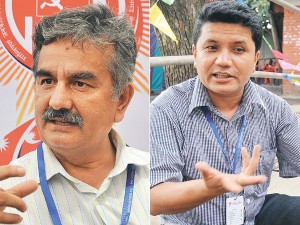Last Wednesday, the Ninth General Convention of the CPN-UML, the second largest party in the Constituent Assembly, began at Bhrikutimandap in the Capital. The Convention, attended by over 2,300 delegates from across the country, will elect the party’s top leadership, including a new chairman, and a 149-member Central Committee. Bitterly contesting the top post are senior leaders KP Oli and Madhav Kumar Nepal, whose barbs have degenerated into ugly personal attacks. Bhadra Sharma and Darshan Karki spoke to Surendra Pandey and Rabindra Adhikari—leaders close to the Madhav Nepal and KP Oli factions respectively—about the UML’s change of guard, the party’s plans for economic revolution and intra-party politics.
The UML talks of handing over leadership to the new generation but young people like you are divided into two factions rallying behind men who have crossed their 60s.
Had there been a trend to transfer leadership to the younger generation previously, by now, people in their 50s would have been leading the party. But for a long time, leadership positions in the party revolved around two or three people. Now we want to do away with this scenario and establish a system that moves forward. So even though leaders above 60 are vying for the top position this time around, younger leaders will get those positions next time. We have come up with two provisions while handing over leadership. First, the leader cannot hold the same position after crossing 70 years of age and second, one cannot contest the top position after serving for two terms. As far as the current situation is concerned, one leader has served the executive position for more than two terms while the other has not. Therefore, when there is a leadership transfer, it should go to the new one. It is pointless for people who are not even ready for a simple transfer of power to talk of transferring power to the next generation.
Post the second Constituent Assembly elections, who does UML now represent? What is its voter base?
It is the people. The party, though based on cadres, is of the people. We believe that it is not enough for party leaders to be endorsed by party cadres but also by the people. Only then, do we have a leader.
What class does the party represent?
To onlookers, the UML might look as though it represents the middle-class but the party represents the proletariats, labourers, middle-class, the capitalist class and all those who stand against injustice and seek to develop the country. It is a party of all the people. But it is not a party of reactionaries.
Talking of leadership transfer, you are trying to establish an old leader. How can you be so certain leadership will come to the young next time around?
It is inevitable; one cannot keep sticking to the old. The new ones will eventually prevail. Even though both the leaders who are contesting are old, isn’t KP Oli is a new face compared to Madhav Nepal? Oli is definitely not completely new but he has not been tested as party head.
It seems as though the two factions are extremely polarised. What results do you expect from the Ninth Convention?
The results will be in favour of a transfer of leadership to KP Oli. The most qualified will be elected.
How would you respond to concerns about KP Oli’s health?
Comrade Oli’s health is definitely a concern but that does not mean he cannot lead the party. Anyone can fall ill and there can be an emergency. But the party works as a team. The top leader does not need to run from place to place. In case Oli’s health does not allow him to work, there will be other provisions. As of now, there is no logic to barring him from contesting the top post.
What direction will the UML take after this convention comes to an end?
We are completing a political revolution by writing the constitution. In the past, we developed cadres and leaders to meet the objective of a political revolution. Now, we will need to develop cadres and leaders for prosperity and economic development. This is the big transformation. We now need people with the knowledge, education and skills for the economic development of the country. We need entrepreneurs, not people who are dependent on others or even on the party.
Political stability is crucial for an economic revolution. But the country has not written a constitution in seven years and leaders within the UML are extremely polarised. How then is economic revolution possible?
This way of doing politics must change. We need to think in a new way. We need to believe in the system and not think that things will not work in the absence of a single person. This Convention will be symbolic of that change. This way
of politics has arisen in the absence of transfer of leadership. We recognise that our current leaders were part of monumental changes in the past but they too must realise that someone new can also bring change.
Any change in the party’s ideology?
Conflict still exists between production relations and productivity. Our
technology, infrastructure and skills are not enough to take the nation where
we want it to go. Our enemy is poverty, deprivation and underdevelopment. Society has changed, we have entered the preliminary stage of capitalism and we want to go towards socialism by winning the votes and confidence
of the people through democratic means. We no longer need guns and wars to achieve socialism. We believe in the people’s mandate.
Are you certain that the party leadership will be transferred to the younger generation after this convention?
Yes, definitely. The process began in the Eighth Convention and will be mainstreamed this time around.

